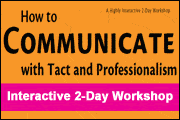Description:

|
The leaders in your organization are the people who share a particular skill: the ability to communicate effectively.
Experts agree that the movers and shakers who climb the corporate ladder fastest are the ones who can relate easily to everyone, present their ideas with conviction and charisma, and emerge from almost every personal interaction on a high note.
Essentially, they've mastered the art of "connecting" with people in ways that almost always yield positive results. They: - Realize that diplomacy works far better than brute force
- Know how to help people "get it" the first time
- Can empathize, and they know how to get the support they need
- Don't waste time rehashing instructions or entering into arguments that go nowhere
- Listen first and act second — not the other way around
Emerge A Far More Powerful CommunicatorWe'll demonstrate and drive home the essential skills you need to become a more polished, persuasive communicator. You'll gain insights into everything from making a good impression … to motivating people...to intervening in tense situations.
Attend this two-day seminar to improve your communication skills. It is packed with one great idea after another, and you'll leave amazed at your new communication skills — and eager to apply everything you've learned.
AGENDA
Day 1
Becoming an exceptional listener - How to grasp what is not being said — but implied
- The advantages of withholding judgment until the end of a situation
- Easy-to-use reminders that fix your attention on the speaker
- How and when to use open-ended, closed-ended, curiosity, and clarifying questions
Tailoring a message to fit your audience - How to break up your message into manageable pieces for maximum impact
- Different strategies for different audiences (staff members, peers, and supervisors)
- Specific language that prevents mixed messages
- Why you must anticipate what your audience wants — and know how to provide it
Using nonverbal communication - How to complement your message with nonverbal communication
- Ways to interpret nonverbal behaviors for a deeper understanding of what's being said
- How to make sure your verbal message is consistent with your nonverbal message
Understanding how your behavior influences others - How to fix situations — not people
- The value of challenging familiar routines and behaviors
- How to uncover hidden agendas, influence outcomes, and overcome conflicts
Giving and receiving feedback - How to evaluate criticism — what to take to heart, what you can safely ignore
- Ways to handle unjust criticism and rejection
- The kind of feedback to use for the fastest results
Day 2 Writing for impact and clarity - How to enhance your credibility through well-crafted memos, letters, and e-mails
- The best way to convey rejection and bad news — and still come out looking good
- Powerful writing techniques that persuade people and affect outcomes
Connecting with different types of people, from boss to spouse - How to interact more effectively with your supervisors — especially your immediate boss
- How to successfully handle a tirade
- Ways to deal with bullies, liars, and other difficult people
Communicating in a diverse environment - A look at diversity in the workplace — how to keep differences in age, gender, race, and culture from hindering communication
- The key to staying focused on outcomes instead of stylistic differences
- Tips to help you overcome strong emotional responses to cultural collisions
Boosting your "power of persuasion" - The first deadly sin of communication — how to resist the temptation
- How to get the support you need for your projects and proposals
- The best way to use stories, case studies, and other anecdotal information
- Why you should build a "trust account" — and when to draw on it
Framing your message in the positive - The best way to frame an unwelcome message
- How to say "no" without feeling guilty or upsetting the other party
- The infectious synergy of positive thinking
|

